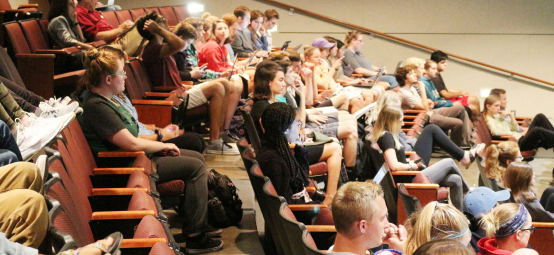
Multiple departments across Truman State University are changing course section offerings to keep up with student demand and new requirements by the University.
Communication Department Chair Jay Self said his department has seen a decline in the number of students who enroll as Communication majors. He said the department is offering fewer elective options next spring because there are not enough students to fill every seat.
“With a decline in the number of majors, then there are fewer bodies in each of those sections,” Self said. “Each class may be capped at 30, but if there is an average of 15 people in them, it is not an efficient use of our resources.”
Instead, Self said the department is offering one or two more sections of public speaking because they serve the greater university.
The communication department also had a faculty member retire. With no one to replace them, the department can not offer as many classes.
Self said there has been little change in the Communication department. With four total fewer sections offered next year, Self said he sees how the change can seem like a lot to students. He also said from a faculty perspective, losing four sections is not a big transition.
Another factor that could impact future course offerings is the upcoming Self and Society seminars next fall.
“It is going to be a seminar for freshmen that all freshmen have to enroll in concurrently with the Truman Symposium,” Art Department chair Aaron Fine said. “Self and Society is a complement to that. A lot of departments will have ones that they want their freshmen to take. We are working on one ourselves.”
Fine said he is thinking about removing the required new majors seminar in his department in exchange for the Self and Society seminar. He also said the new curriculum has made slight changes to what his department is offering in the future.
“With the new liberal studies program curriculum, that requires sections,” Fine said. “So you are trying to manage a transition where you are offering everyone enough of what they need. We are looking at the same number of courses in this curriculum as in [the last], but it can be hard to manage the transition when we have students needing both.”
Fine said there was concern about fitting the old LSP with the new curriculum, but the transition has been easy thus far, and very few of the department’s courses were impacted.
Amber Johnson, Sociology, Anthropology and Justice Systems Department chair, said there was a sociology and anthropology faculty member who resigned at the end of the semester, meaning her department had to make up for one fewer faculty member in the spring semester.
Justice systems had the same number of faculty, but Johnson said the classes have already been tight in the past.
Johnson said schedules for both programs are the tightest they have ever been because faculty numbers are the smallest they have ever been as the department does two faculty searches.
Johnson said new faculty won’t be in place until next August at the earliest.
Johnson said the department usually offered three sections of upper-level topics classes for sociology and anthropology, and this spring there is only one. She also said the justice systems major had certain classes with fewer section offerings than previous years, giving students less course variety.
“As faculty and as chair of the department, one of my responsibilities is to make sure that all students are able to access the classes that they need to make progress in their major,” Johnson said. “It’s very frustrating when you’re limited by the number of faculty you have teaching or the number of sections you can offer.”
Johnson said she has been working with students who are reaching out to faculty about overrides to make sure students in each major got into a class that helped them work toward their major requirements this spring.
Johnson said faculty in her department will be teaching larger sections, and some will be teaching courses that are new for them. For the sociology track, a professor has offered to teach extra large sections of SOAN 190: Sociological Inquiry next semester. Johnson said a course that would normally be 25-30 students will now have a few sections of up to 50 students. Johnson said she hopes the difficulties in her departments will pass as soon as they make their new hires.
“The long-term trend of smaller enrollments is one the whole campus community has been focused on,” she said. “That is something we will be dealing with for a long time, and there are no easy solutions.”
